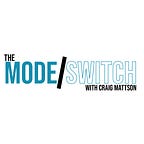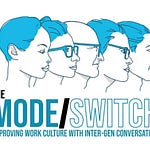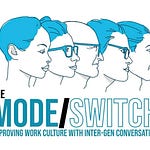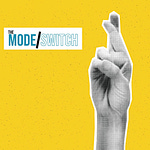Volume 1, Issue 19
This week, I want to ask you a question. How long do you think you can keep all this up at work?
For half a year now, I’ve been interviewing early-to-mid-career professionals, asking how they deal when everything’s way too much. Not sure if that’s you exactly or not, though I think everybody feels that professional life is more than it should be. But early vocational overwhelm is especially tough.
You know all those red and blue stadium chairs in the Ted Lasso opener? If that were a graphic display of my intended audience, you’d be sitting right next to Jason Sudeikis, barely visible, but very much there. So, who are you? Lessee here. Lemme look at my interview data. I’m squinting now.
I’m seeing you when you were exiting college, launching into your first job. Remember when your Macbook Air was littered with StrengthsFinders assessments? Remember when your single-page resume highlighted your proficiency with Microsoft Word? Your cover letter had already shown up on Monster.com for 152 different job postings.
Remember back, a long, long time ago, about six jobs back to be exact, when you wandered into your first workplace floor, trying to look casual and generically competent? Mostly, you were wondering where the manager’s desk was, truth be told. About three jobs later, you had figured out that, wait, you are the manager. Nobody’s tracking your hours anymore. The one-up notices precisely nothing about what you do so long as you keep the team motivated and don’t bottom out the budget.
Now, maybe, you have better benefits than you used to. You have a ROTH IRA. You also have an ache in your left knee during every-other-daily jogs. You’re thinking about kids. (How am I doing? Any closer?) You lead a team of four at work. You’re starting to have a client base that just might go with you if your company ever had to let you go.
Do I have you right? Am I speaking to you now? Because, after talking to, what is it now, just under half a hundred interview participants in my oh-so-carefully designed qualitative research study, I have this question, which I haven’t asked anyone yet—but wish I had:
How long do you think you can keep all this up?
It smells like a rude question. But I’m asking it in your direction, where you perch over there in that corner of the global marketplace, doing that job that some days does some good in the world. I’m guessing you care about the world and the world’s people too much to do another kind of job. Our planet’s getting way too hot to clock in and design another cool widget.
But okay, now that I have you, sort of, would you tell me this? How much longer can you keep doing your job with such quiet competence? How much longer can you keep pouring yourself into emails an hour-plus every night after Hulu? And most weeks, you’re at it on Saturdays, too? Where are you going to find the extra gear to keep doing this mostly justifiable thing for another decade?
My generation has been telling your generation, for a long time now, that the most important thing in life is to do what you love. Do you buy that tidy little saying? If the first decade of professional life has made anything clear, it’s that your job’s just not that into you. Or it’s into you for all the wrong reasons. Your job wants your love so that you’re email-accessible at 10:30 at night.
Besides, saying you do your job for the sake of love feels, I don’t know, kind of religious or something. I mean, you might be a person of faith—I can’t tell from here, even if I squint. But nothing about your job, absolutely nothing, feels like it requires religion. Process. Tech. Algorithms. Operations. Products. Services. Accounts. None of that requires any justification or guidance except ROI. Right? I mean, your company has its values. But even being mindful about implicit biases and, you know, not being a creep doesn’t seem to oblige faith at work.
Truth be told, when it comes to being a good person at work, being religious can be kind of sus.
You’re right. I shouldn’t use Gen Z slang without more practice. But I’ve been spending a lot of time with Gen Zs lately. So it just sorta comes out.
I’m writing this at a Chipotle on the corner of Lake and Orleans in downtown Chicago, having just finished a day of teaching social entrepreneurship to some very smart undergrads in the Chicago Semester program.
Our guest today was Rabbi Elan Babchuck, who wanted us to understand the importance of storytelling in vocational and community life. There are, he said, two kinds of narratives about our life and work. One is the Genesis Story. It goes like this: Things used to be this way, then we did this thing, and now things are this other way. It’s a clean and compelling story, but it’s also dangerous in its linear simplism. The other kind of story is an Oscillatory Story. You know, like a fan that oscillates back and forth, back and forth. This kind of story shifts constantly between what’s hard and what’s good, what’s tough and what’s beautiful in a Charles-Dickens best-of-times, worst-of-times sort of way.
And, said the rabbi, it’s the Oscillatory Story that builds resilience and wisdom.
So, back to my question. How long can you keep all this up? If you answer, “Some days, I can keep it up forever—other days, I can’t keep going till lunch” that’s a pretty good Oscillatory Story. Your answer takes shape somewhere in the movement between grit and grace. The wisdom happens in the toggle between the two.
One more thing. If you’re down for this, I’d like a chance to hear your answer to this question. Think you can find an hour in June to talk with other Mode/Switch readers about how you’re doing vocation and life all at once? Put your email in the comment below, and we’ll put together a conversation with other people willing to think about the best things, and the worst, at the same time.
Thanks for reading this. And keep up the toggle.
Craig












